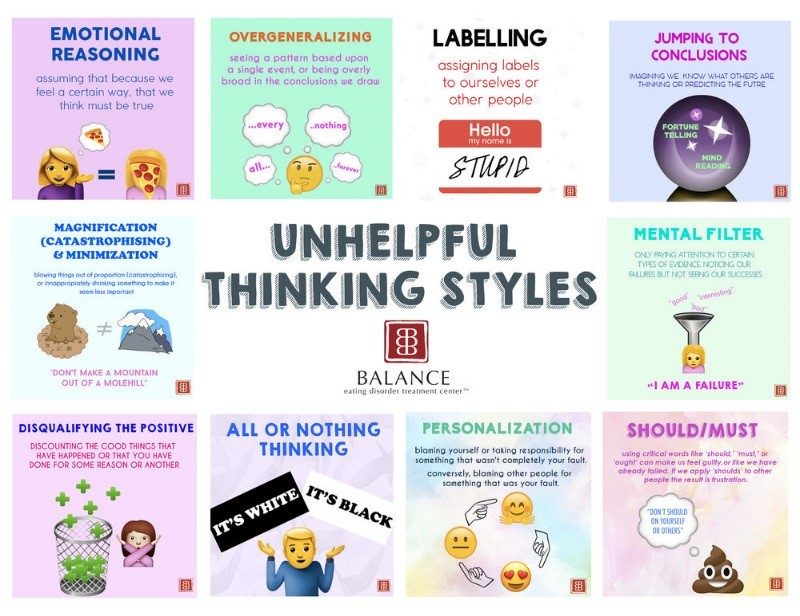Overcoming Unhelpful Thinking
 Image Source: BalanceEDTC
Image Source: BalanceEDTC
Challenge: Think to yourself – when you post a picture online what is it often of? Where do you post it? And why do you post it?
Often, when people post pictures or videos online it is of themselves on holiday, at social events, with friends and family or doing hobbies. This can inspire you to try out a local restaurant, put a different country on your bucket list, bake a new dish or learn a new life skill. However, it is important to bear in mind that people only ever post about their highlights and the good times, and this doesn’t necessarily translate to a picture perfect life. Photoshop, exaggerations, #ad and filters can make things appear different then they really are. Too often it is easy to see images of other peoples’ lives online and compare it to our own. We might feel lonely, or have a fear of missing out (FOMO), when we see pictures of our friends doing things without us. We might feel jealous of people’s lives; their families, homes, holidays or clothes. This can lead to us feeling under pressure to change or fit in. When this happens, it is important to recognise and challenge unhelpful ways of thinking.
Common unhelpful thinking patterns:
- Not getting as many likes/comments as you’d expected and questioning your self-worth
- Seeing an image of someone else and feeling like you need to take measures to look more like them
- Thinking your life is rubbish because it does not seem as exciting as what your friends are posting online
- Saying things to someone online that you wouldn’t usually, because that person isn’t physically in front of you
Social media influencers, YouTubers, and other celebrities are often paid to feature certain brands or products in their posts. They may make this very obvious when they review or recommend a product, or it  may be more subtle such as them driving a certain car, going on paid and endorsed holidays or holding the latest gadget. This gives the impression of a highly luxurious, easy and exciting life – but often is not how it looks. It can be tempting to feel that to fit in or feel good about ourselves we need to constantly buy new things or live a certain way. This can be unattainable, expensive, and affect our self-esteem. It is important to think about whether we want or need something we’ve seen and learn to value ourselves by who we are, not what we have. For some advice on managing these feelings read this.
may be more subtle such as them driving a certain car, going on paid and endorsed holidays or holding the latest gadget. This gives the impression of a highly luxurious, easy and exciting life – but often is not how it looks. It can be tempting to feel that to fit in or feel good about ourselves we need to constantly buy new things or live a certain way. This can be unattainable, expensive, and affect our self-esteem. It is important to think about whether we want or need something we’ve seen and learn to value ourselves by who we are, not what we have. For some advice on managing these feelings read this.
Image Source
One of the most reported negative effects of social media is the impact on children and young people’s body image. Constant bombardment of ‘perfect’ images that have been edited creates an unrealistic and unachievable image that many young people strive to achieve and feel inadequate when they cannot. Building up a positive image from a young age can help build resilience to these sort of images. Dove run a Self-Esteem project where they provide resources for parents to build their positive body mind-sets.
For an explanation of body image and tips on how to be body positive, click here and here.
The links on this page include information and strategies on managing unhelpful thinking. Here are a few more:
Strategies:
- Recognise times when you start to slip into unhelpful thinking online – think about what site you were on, what emotion you felt and why you think you felt it. Once you understand this yo
 u have the power to make a change.
u have the power to make a change. - Remember that everything is not always as it seems – people present an image online that they want people to see.
- Filter out harmful pages or themes – beware of pages encouraging anorexia, self-harm, drug use, etc.
- Follow positive, inspiring role models
- Learn how to get a better balance, especially if you are starting to be obsessed with certain people you follow online (for tips, read this).
- Be kind to yourself
- Build your resilience


